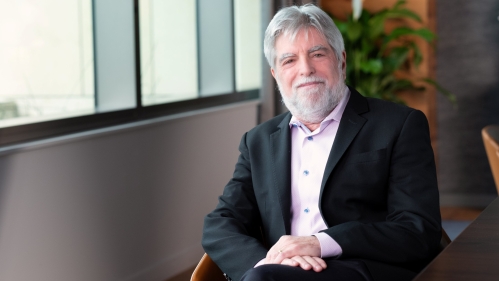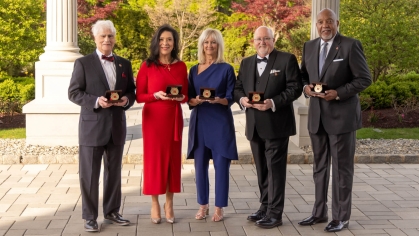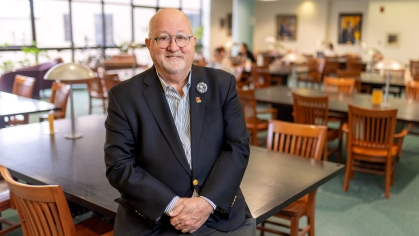The work of Jeffrey Bluestone, who will be inducted into the Rutgers University Hall of Distinguished Alumni, has led to new treatments for cancer and autoimmune diseases.
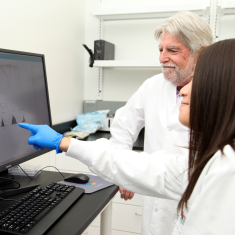
Jeffrey Bluestone, an internationally regarded immunologist whose work has brought hope to people dealing with diabetes, cancer, and other diseases, traces his love of research to his senior year at Rutgers.
Bluestone CC’74, GSNB’76 was a biology major with an eye toward becoming a veterinarian or perhaps a physician, but then he signed up to work on a research project under Robert Cousins, an assistant professor who was studying the role of heavy metals in metabolism. Cousins would go on to become one of the foremost experts on the nutritional significance of zinc. “My time in his lab was pretty transformational,” Bluestone says. “He was an incredible mentor and an amazing scientist, and I got very excited about the idea of going into research as a profession.”
Bluestone decided to pursue a Ph.D. in immunology and has since spent more than four decades in the biomedical sciences. He has been a faculty member at two leading research universities and director of a cancer research institute and diabetes center; today he is co-founder and CEO of a private biotech company. His work has shed light on how the immune system works and how it can be modified to prevent and treat disease. His research has led to the development of several drugs now on the market, including one that can delay or even prevent Type 1 diabetes and others for treating rheumatoid arthritis and metastatic melanoma.
In 2023, he was elected to the National Academy of Sciences—one of the highest honors bestowed on American scientists. He will be inducted into the Rutgers Hall of Distinguished Alumni on April 25.
‘A Great Place for Me to Go’
A self-described Army brat, Bluestone was born in Oklahoma and grew up in northern New Jersey. “I was interested in science from a pretty young age, you know, with the rock collections, blowing things up in the basement,” he told an interviewer in 2017. When the time came to choose a college, the decision to attend Rutgers was an easy one. “I applied to a number of schools,” he says, “but at the end of the day I felt Rutgers was a great school and the economics were favorable. I felt it was a great place for me to go.”
It was the height of the Vietnam War, and Bluestone was active in campus protests. “Students at the time were very focused on what was happening in the world,” he says now. “It was very impactful.” He also joined Sigma Alpha Mu fraternity and has fond memories of Bruce Springsteen playing at The Ledge (now the Student Activities Center).
He also joined the crew team and wound up as the coxswain, which taught him important lessons: “It’s not how strong any individual is, it’s not how much endurance anyone has,” he says. “It’s how well they work together that determines whether you’re going to be successful. And the job of a coxswain is to help encourage and support that team effort.” Collaboration would become a theme throughout his career, as he’s tried to make science less “silo-ized” and instead build consortiums of researchers. In 1999, for instance, he founded the Immune Tolerance Network, bringing together about 100 scientists and clinicians to accelerate immune system research.
Fighting Cancer with Research
After finishing his bachelor’s and master’s degrees at Rutgers, Bluestone earned his Ph.D. at Cornell University, doing his doctoral research at New York’s Memorial Sloan Kettering Cancer Center. His work focused on harnessing the immune system to fight cancer. The idea was new at the time, but today, several immunotherapy drugs used in cancer treatment are based on the work Bluestone and others did.
Bluestone then started to wonder if the immune system could be manipulated in a different way. The system is a two-sided coin, he explains. When it does its job properly, it can ward off an infection or destroy cancer cells. But when it malfunctions, it can attack the body’s own tissues, leading to autoimmune diseases like diabetes, inflammatory bowel disease, and rheumatoid arthritis. In postdoctoral work at the National Cancer Institute, and as a university faculty member for 35 years—first at the University of Chicago, then at the University of California San Francisco—Bluestone sought to answer the question, “How do we turn the immune system off?”
The work of Bluestone and his collaborators helped lay the foundation for several drugs that are now in use, including abatacept, sold under the brand name Orencia for treating rheumatoid arthritis. But Bluestone is perhaps best known for research that led to the development of teplizumab. Approved by the FDA in 2022 and marketed under the brand name Tzield, teplizumab is a first-of-its-kind treatment for Type 1 diabetes. Clinical trials showed that 14 days of treatment with teplizumab could delay the onset of diabetes by two years on average—and in some cases prevent diabetes altogether. It’s a significant step forward in dealing with a disease that previously had no available treatment, other than a lifetime of insulin injections.
The work that resulted in teplizumab—much of it in collaboration with Yale endocrinologist Kevan Herold—spanned more than 35 years, an unusually long time even in the world of drug development.
“There was a lot of drama along the way. This drug died multiple deaths,” says Doug Lowenstein, a former journalist and a consultant to the Juvenile Diabetes Foundation, who is writing a history of teplizumab. “But Jeff and Kevan never gave up on it. They never wavered in their belief in this drug—that it was going to change lives.”
In addition to his work in preventing autoimmune diseases, Bluestone has remained interested in the use of immunotherapy in treating cancer. He was founding director of the San Francisco-based Parker Institute for Cancer Immunotherapy, and some of his early work led to the development of ipilimumab, sold under the brand name Yervoy, for treating metastatic melanoma.
Cell Therapy Entrepreneur
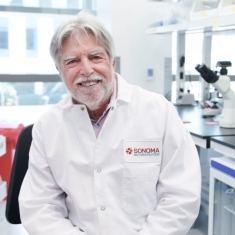
In 2019 Bluestone left UCSF, where he was the A.W. and Mary Margaret Clausen Distinguished Professor of Metabolism and Endocrinology, to start a private company, Sonoma Biotherapeutics. The move allows him to a focus on a newer idea: cell therapy. The idea, he says, is to use the body’s own cells to create drugs. “We've been doing drug development for decades now, and there are some amazing drugs out there,” he says. “But rather than making a synthetic drug or a monoclonal antibody and treating somebody, could we use our own cells?”
A few anti-cancer drugs already on the market use the idea of cell therapy, or cell transplantation—removing a patient’s own cells, reengineering them, and then reimplanting them. Bluestone is hoping to apply the same concept to the other side of that coin, to shut down harmful immune responses in people who have autoimmune diseases. It’s early yet, he says. But if his past success is any indication, it’s only a matter of time before he—and his collaborators—make it happen.
Bluestone is one of five new inductees who will be formally enshrined into the Rutgers Hall of Distinguished Alumni in a ceremony starting at 6 p.m. Thursday, April 25, at the Stone House at Stirling Ridge in Warren, New Jersey. For more information, visit the Hall of Distinguished Alumni page.
Nominators’ Remarks
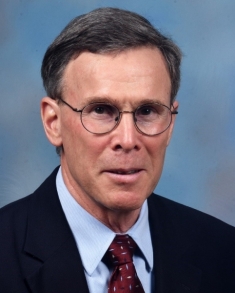
Dr. Richard Baer and Dr. Curt Hagedorn nominated Bluestone for the Hall of Distinguished Alumni.
“Dr. Jeffrey Bluestone’s brilliant work has provided pioneering insights into mechanisms of T-cell activation and immune tolerance, which he has applied in groundbreaking approaches in treating patients with cancer, organ transplants, and autoimmune disorders. His example highlights the value of undergraduate discovery work, the role of faculty mentors, the importance of careful problem selection, the impact of building large biomedical discovery teams, and the advantages of being a student at Rutgers—a large discovery university and member of an elite group of Big Ten research universities.” —Dr. Curt Hagerdorn RC’72, RWJMS’74, professor at the University of New Mexico School of Medicine
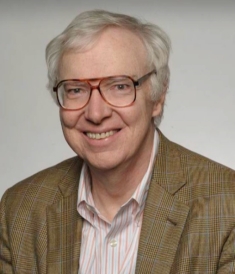
“I have followed Dr. Jeffrey Bluestone’s remarkable scientific achievements for more than 30 years—uncovering basic mechanisms of immunology and exploiting this information to benefit patients afflicted with a broad spectrum of diseases. He ‘cut his teeth’ scientifically in Rutgers Cook College laboratories, and the three of us were contemporaries on campus way back in the ’70s. Needless to say, we’re proud of his many accomplishments and thrilled that Jeff will return home to Rutgers for his induction into the Hall of Distinguished Alumni!”—Dr. Richard J. Baer, professor of pathology and cell biology at the Columbia University Irving Medical Center
WE ARE YOU is an ongoing series of stories about the people who embody Rutgers University’s unwavering commitment to academic excellence, building community, and the common good.

